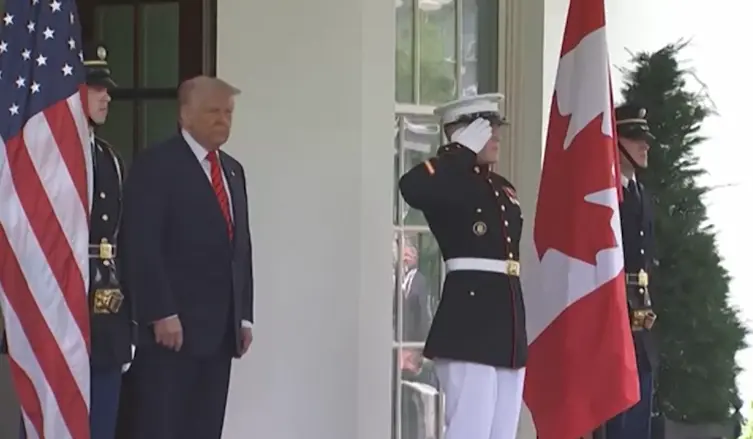
The Peace Prize Paradox - The US State Department reaffirms Donald Trump’s role in brokering the India-Pakistan ceasefire, contradicting India’s official stance
The Claim That Won’t Die: Trump’s Ceasefire Boast and India’s Rebuttal
Diplomatic Fault Line – In the aftermath of the four-day military conflict between India and Pakistan in May 2025 triggered by India’s Operation Sindoor in response to the Pahalgam terror attack US President Donald Trump has repeatedly claimed credit for brokering peace between the two nuclear-armed nations. Speaking at multiple events, including the NATO Summit in The Hague, Trump asserted:
“We stopped a lot of fights. A very, very big one was India and Pakistan. We stopped that over trade.”
He claimed that threats to halt trade with both countries forced them to de-escalate, and even described Pakistan’s General Asim Munir as “very impressive” while calling Prime Minister Modi “a great gentleman.”
India, however, has consistently denied any US involvement. Prime Minister Modi reportedly told Trump during a phone call that the ceasefire was a result of direct military-to-military communication between the Directors General of Military Operations (DGMOs) of both nations. External Affairs Minister S. Jaishankar reinforced this, stating:
“I was in the room. There was no mediation. The ceasefire was negotiated bilaterally.”
Despite these denials, the US State Department has stood firm. Spokesperson Tammy Bruce, when asked about India’s rebuttal, responded:
“Everyone will have an opinion. Some opinions are wrong; mine rarely are.”
Her remarks, laced with irony, were seen as a subtle rebuke to India’s position. Bruce emphasized the transparency of modern diplomacy, suggesting that real-time global events allow people to “see what’s really occurring.”
Strategic Fallout: Diplomatic Tensions and Political Undercurrents
The clash over Trump’s claim has triggered a wave of political and diplomatic consequences:
India’s Position:
- Maintains that the ceasefire was initiated by Pakistan’s DGMO and accepted by India.
- Rejects any suggestion of US mediation or trade-linked pressure.
- Emphasizes sovereignty and bilateralism in conflict resolution.
US Narrative:
- Credits Trump, Secretary Marco Rubio, and Vice President JD Vance for facilitating the truce.
- Frames the intervention as a strategic success in preventing nuclear escalation.
- Uses the claim to bolster Trump’s foreign policy credentials amid his nomination for the 2026 Nobel Peace Prize.
Political Reactions:
- Congress Party in India seized the moment to criticize the Modi government, asking whether national dignity was compromised.
- Opposition leaders questioned the silence of the ruling party and demanded clarity on the nature of US-India communications during the conflict.
- Pakistan, meanwhile, praised Trump’s efforts and formally recommended him for the Nobel Peace Prize, further complicating the narrative.
The controversy also risks straining India-US relations, especially as both nations navigate trade negotiations, defense cooperation, and strategic alignment in the Indo-Pacific.
The Bigger Picture: Perception, Power, and the Politics of Peace
At its core, the Trump truce debate is about more than just who made a phone call, it’s about who controls the narrative in global diplomacy.
Real-Time Diplomacy:
Tammy Bruce’s comments highlight a shift in how diplomacy is perceived. With social media, satellite coverage, and instant news, governments can no longer shape narratives in isolation. Public opinion is formed in real time, and leaders are judged not just by outcomes, but by optics.
Sovereignty vs. Soft Power:
India’s insistence on bilateralism reflects its long-standing policy of rejecting third-party mediation, especially on sensitive issues like Kashmir. The US, on the other hand, sees value in projecting influence even retroactively over global flashpoints.
The Risk of Miscommunication:
Conflicting claims can erode trust, especially when strategic partners disagree publicly. If left unresolved, such disputes may impact future cooperation on counterterrorism, trade, and regional stability.
The Peace Prize Paradox:
Trump’s repeated claims and Pakistan’s Nobel nomination raise questions about the politicization of peace. Can a ceasefire be claimed as a diplomatic victory if one party denies the mediator’s role? And does such recognition help or hinder long-term peacebuilding?
The Nobel Peace Prize That Keeps Eluding Trump Nobel Obsession: From India-Pakistan to Iran-Israel,
Stay updated with the latest news on Rapido Updates. Keep yourself updated with The World, India News, Entertainment, Market, Automobile, Gadgets, Sports, and many more